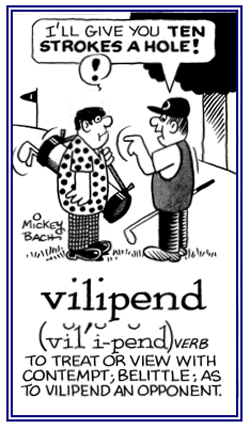pend-, -pens, -pense, -pending, -pended
(Latin: hang, hanging; weigh, weighing; to cause to hang down; related to words in this pond- unit.)
suspensive
suspensively
suspensory
Testes ponderantur, non numerantur. (Latin proverb)
Translation: "Witnesses are weighed, not numbered."
That is, in case of a conflict of evidence, the truth is to be sought by weighing the credibility of the respective witnesses, not by the mere numerical preponderance on one side or the other.
Testimonia ponderanda sunt, non numeranda. (Latin proverb)
Translation: "Evidence is to be weighed, not enumerated."
Testis de visu preponderat aliis.
An eye-witness is preferred to others.
A legal maxim about testimony.
total energy expenditure (TEE), total daily energy expenditure (TDEE)
The total energy requirements of a person over the course of an entire day, including rest and sleep as well as actual physical activity.
total suspended particulates (TSP); total suspended particulate matter (TSPM)
The total amount of tiny airborne particles or aerosols present in the atmosphere at a given time.
These can be produced by natural processes; such as, evaporation, forest fires, volcanic eruptions, or pollen dispersal, but TSP measurements usually refer to pollutants from human sources including fuel combustion, coal burning, municipal waste incineration, and so on.
total suspended solids (TSS)
All of the solid particles in wastewater, effluent, or a natural body of water that will not pass through a filter of a given size; components may include silt, decaying plant and animal matter, industrial wastes, and sewage.
A high TSS concentration can have a significant effect on an aquatic system resulting in slowing photosynthesis and reducing oxygen levels.
vilipend (verb), vilipends; vilipended; vilipending
1. To treat another person with contempt as if he or she does not deserve any respect: Max feels that people vilipend him simply because he is a homeless person.
2. To disparage or to express negative opinions or comments about someone or something: When Jake was playing tennis, his opponent, Jack, was vilipending him as if he could never hit the ball back across the net.

© ALL rights are reserved.
Go to this Word A Day Revisited Index
2. To disparage or to express negative opinions or comments about someone or something: When Jake was playing tennis, his opponent, Jack, was vilipending him as if he could never hit the ball back across the net.

Go to this Word A Day Revisited Index
so you can see more of Mickey Bach's cartoons.
1. A statement or an act in which someone speaks contemptuously about a person or a situation or expresses strong disapproval of someone or what another one is doing or has done.
2. Etymology: from Old French vilipender; from Latin vilipendere, literally "to consider base"; from vilis, "cheap, base (without moral principles)".
2. Etymology: from Old French vilipender; from Latin vilipendere, literally "to consider base"; from vilis, "cheap, base (without moral principles)".
A person who says abusive or derogatory things about another person or certain situations or things.
vilipensive (adjective), more vilipensive, most vilipensive
A reference to the treatment of someone with contempt or conveying malicious statements about others or actions that have taken place.
voltage-dependent resistor, varistor
A two-electrode semiconductor device having a voltage-dependent nonlinear resistance.
Its resistance drops as the applied voltage is increased.

